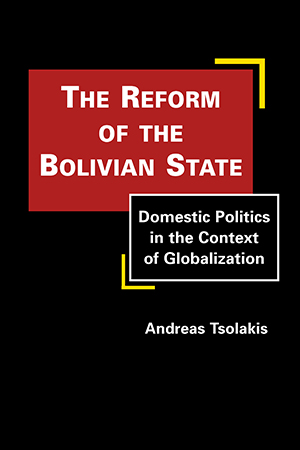
- 2010/393 pages
- A FirstForumPress Book
The Reform of the Bolivian State:
Domestic Politics in the Context of Globalization
Hardcover: $79.95
ISBN: 978-1-935049-27-2
Ebook: $79.95
ISBN: 978-1-62637-142-2
In 2005, two decades after President Victor Paz Estenssoro's New Economic Policy heralded the beginning of a profound transformation for Bolivia, violence had become endemic in the country, the economy was weak, and political corruption was flourishing. Evo Morales was elected to the presidency in a climate of intense social conflict and disorder, promising to deconstruct the entire political and economic edifice so painfully built since 1985. Andreas Tsolakis investigates Bolivia’s trajectory since 1985 in the context of the country’s deepening integration into the world market.
From a historical materialist perspective, Tsolakis assesses why neoliberal restructuring efforts failed, as well as the implications of the continuing internationalization of the Bolivian state for Morales's reform program and his foreign relations in Latin America and beyond. He provides both a nuanced analysis of collaborative practices among transnational social forces and an up-to-date, critical analysis of the Morales administration.
From a historical materialist perspective, Tsolakis assesses why neoliberal restructuring efforts failed, as well as the implications of the continuing internationalization of the Bolivian state for Morales's reform program and his foreign relations in Latin America and beyond. He provides both a nuanced analysis of collaborative practices among transnational social forces and an up-to-date, critical analysis of the Morales administration.







